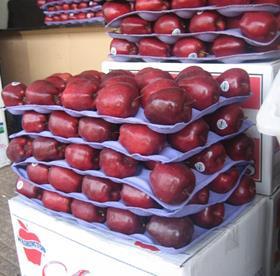
Washington apples have been moving in bumper volumes to India this year, but the trade has received a jolt with India’s announcement on 18 May that it proposes to apply an additional 30 per cent duty on US apples from next month.
India has told the WTO it proposes to raise duties on 20 products from the US in retaliation to US duties on steel and aluminium products, with a number of agricultural products in the firing line.
US apples face an additional duty of 30 per cent, which, when combined with the existing 50 per cent tariff levied on all apple imports to India, would take the total duty to a swingeing 80 per cent.
US walnuts will be hit with an additional duty of 100 per cent, while shelled almonds and in-shell almonds face increases of 20 per cent and 10 per cent respectively.
On 9 March, US President Donald Trump imposed a 25 tariff on steel and a 10 per cent tariff on aluminium items imported from all countries except Canada and Mexico, a move that sparked fears of a global trade war. India sought exemption from the tariffs, but the apparent lack of response has seen it resort to retaliatory tariffs.
In a WTO notification, India told the Council for Trade in Goods it was “suspending concessions and other obligations” that were “substantially equivalent to the amount of trade affected by the measures imposed by the United States”. It said the proposed suspension of concessions would be in the form of “an increase in tariffs on selected products originating in the US”.
The WTO notification states the tariffs will take effect “earlier than 21 June 2018, in case the US decides to continue the period of application of the measures.”
Apple shipments touching 7m cartons
With Washington apple exports to India in full flow, and around 1,500 containers of fruit reported to be on the water, the notification has sparked alarm in the trade.
“We’re in the process of determining the impact of the India situation as the WTO notification provides no concrete timeframe for potential implementation,” Todd Fryhover, president of the Washington Apple Commission told Asiafruit. “Trade discussions are occurring at an unprecedented speed and aligning our industry position is proving to be a moving target.”
As of 15 May, Washington had shipped more than 6.64m cartons of apples to India in the season to date, a substantial increase on the 4.5m cartons shipped in 2016/17. That volume makes India the third largest export market for Washington apples. Many in the trade had expected India to continue shipping for several more weeks, especially since Chinese apples are currently banned from the Indian market, but the looming duty imposition could put the brakes on trade.
“Typically, and this isn’t a typical season with China out of the India, Washington would see shipments drop of about this time of the season,” said Fryhover. “Up to the India tariff announcement, interest from India has been high and the industry has been shipping good volumes. How many more weeks we can ship depends on many factors – the WTO announcement just creates questions, it doesn’t answer any.”
Tarun Arora of leading Indian fruit importer IG International told Asiafruit arrivals of Washington apples were touching the 7m-carton mark, and that he expected them to reach 7.5m cartons in the next three weeks. While difficult to gauge the impact of a potential 80 per cent duty on trade, Arora predicted that volumes would likely 'halve' if it were applied in the future. He said the US Embassy in India and US Trade Commission were negotiating with the Indian government to try and prevent the retaliatory tariffs from being implemented.
Gagan Khosla of major importer NGK Trading said the duty would have 'a big negative impact' on Washington imports. 'Costs will go up by around US$8 a box, making consumption plummet,' he said.
Whether the high-level trade talks between the US and China last weekend will see the US wind back tariffs on steel and aluminium products remains uncertain. US Treasury Secretary Steven Mnuchin said Tuesday that US tariffs on Chinese steel and aliminium imports would stay in place even as the Trump administration suspends separate proposed tariffs on Chinese goods, according to reports from CNBC International. CNBC said the US tariffs on metals were part of President Trump's pledge to crack down on alleged trade abuses by foreign countres, and that the administration was separating them from other measures specific to China.



